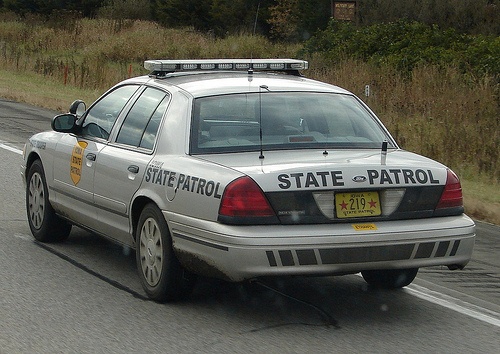






Poker Players Get Robbed Under Guise of Civil Asset ForfeiturePoker Players Had Their Constitutional Rights Violated, Lawyer Says |
|
|

The fancy legal term may be ‘civil asset forfeiture,’ but for a couple of poker players who saw Iowa police take $100,000 of their money it is just straight up robbery.
In April of last year, poker players William “Bart” Davis and John Newmerzhycky were driving west through Iowa with out-of-state plates after a poker road trip. In their car was a lot of cash, and after getting pulled over for allegedly failing to use their turn signal a K-9 unit was brought in and the cash was gone—sucked into the coffers of the Iowa police.
The incident stunned them, but after their California homes were searched because cops thought they were involved in the drug trade, it really started to negatively impact their lives. Fortunately, felony charges were eventually dropped in California, though Newmerzhycky said he suffered a stroke as a result of the stress. Both said their livelihoods were hugely affected.
Since then, the poker players have been on a crusade to get their money back, plus damages. Their case isn’t anything out of the ordinary, as The Washington Post pointed out recently.
There have been 61,998 cash seizures made on highways and elsewhere since 9/11 without search warrants or indictments through the Equitable Sharing Program, totaling more than $2.5 billion. State and local authorities kept more than $1.7 billion of that while Justice, Homeland Security and other federal agencies received $800 million. Half of the seizures were below $8,800.
Basically, your property is guilty until you prove it innocent.
“My clients were caught in the middle of this,” Glen Downey, attorney for both Davis and Newmerzhycky, told Card Player on Friday. (Downey is listed as an attorney on the National Police Accountability Project’s website.) “They made the mistake that a lot of people make accidentally: They were driving on a major interstate, through Iowa in this case, with an out-of-state plate.”
Ninety percent of stops by the police officer who pulled over Davis and Newmerzhycky involve cars with out-of-state plates, the complaint (at the bottom of this article) said.
Basically, the poker players did not consent to a search and the cop didn’t allow their request to be honored. The stop violated the Constitutional rights of the poker players, Downey said.
Card Player had the chance to ask Downey a series of questions about the topic.
Brian Pempus: Can you talk about when civil asset forfeiture became a really big issue?
Glen Downey: One of the things you will notice, if you look at public records, is that there was a large change after 9/11 in terms of the amount of money seized. Civil forfeitures aren’t anything new. The concept of a civil forfeiture has existed for awhile, it has just become much more common for it to be used. There are a couple of reasons. One of which is 9/11 bringing an increased focus on making sure we are vigilant about what’s going on [within our borders]. That’s one explanation, but I don’t think it’s the explanation that really satisfies our curiosity as to why there has been a huge increase. I think what we’ll discover is that the real explanation is that we are in an era of budgetary shortfalls. A lot of police departments, like other government agencies, are hurting for cash.
When they seize the money, they are allowed to keep it. They aren’t allowed to use it for anything, but they are allowed to use it for training and other purposes, which allows them to allocate the money that ordinarily would be used for that kind of stuff to other critical areas.
 BP: Iowa has casinos that have poker tournaments. Do you think that this adds to the absurdity of the situation? People come to Iowa from elsewhere to play poker. It doesn’t make sense to me why law enforcement would be confused about people carrying around large sums of money, especially when they say they are poker players. Is this fair to say?
BP: Iowa has casinos that have poker tournaments. Do you think that this adds to the absurdity of the situation? People come to Iowa from elsewhere to play poker. It doesn’t make sense to me why law enforcement would be confused about people carrying around large sums of money, especially when they say they are poker players. Is this fair to say?
GD: Yes. In fact, there isn’t anything illegal about carrying around large sums of cash, but it seems that Drug Interdiction Officers are trained to think that there’s something suspicious going on—that there’s likely something illegal about it. There was a large Washington Post report on this a couple of weeks before I filed this complaint, and they did a 10-minute video and they showed some parts of Drug Interdiction stops, and in one situation a guy told law enforcement that his $6,000 was from a Las Vegas trip. The officer said to him, “Good luck proving that buddy, you will burn that up in attorney’s fees before we ever give a dime back to you.”
The tactic is to find a large amount of cash…and they won’t criminally charge you if you sign a piece of paper saying that you don’t know where the cash came from. It’s giving the cops the cash in exchange for them not trying to charge you. Some people are scared and don’t want to be arrested and sign that piece of paper. Most of the time it’s smaller amounts, and almost all of them don’t result in a criminal charge.
BP: If it isn’t illegal, why can the cops even ask if you are carrying cash?
GD: Well, they are always allowed to ask. You are under no obligation to tell them. They are allowed to ask you to identify yourself. You can decline to do that, under certain circumstances. However if you do, you can’t falsely identify yourself. They can ask if you are carrying large amounts of cash. If you watch the video from my clients’ case you will see that they in fact refused to allow them to search the vehicle. They did not consent, but the police officers did it anyway.
BP: It seems that a lot of the time, when a K-9 unit is called in, the cops claim that the dog was tipped off to something. That seems really vague. Can you talk about how that tactic is used to get a search of the vehicle and how that may be a lie?
 GD: One of the things that experts testify to is that any time there is a large amount of currency a drug dog will alert the cops to it. At some point in that currency’s life it has probably come in contact with drugs. So, the notion is that if there is a large amount of cash, the drug dog will alert the cops and the cops will say, “See, there are drugs involved.” It actually doesn’t mean anything of the sorts…Police officers know this.
GD: One of the things that experts testify to is that any time there is a large amount of currency a drug dog will alert the cops to it. At some point in that currency’s life it has probably come in contact with drugs. So, the notion is that if there is a large amount of cash, the drug dog will alert the cops and the cops will say, “See, there are drugs involved.” It actually doesn’t mean anything of the sorts…Police officers know this.
BP: Is it common for the police officer to come up with a story—the alleged not using the turn signal in your clients’ case—and then that story to turn out to be an outright lie?
GD: Well, one of the reasons they use that is because U.S. Supreme Court law has indicated that even a minor traffic violation gives them a reason to pull a car over. Officers will look at that as an initial reason to pull the car over in the process of trying to figure out a way to try and search it…With that being said, it’s only a temporary ability to stop the vehicle. You can only stop it long enough to carry out the original purpose of that stop. If you stop them for allegedly failing to signal, you can write them a ticket for that or you can let them go after you have done that. However, you discover officers have been trained to bring the person back, conduct a motorist interview, to get information from them. They then write the ticket and tell the person they can go, but then ask the person if they will answer a few more questions. Then they say, “Hey, do you have anything in the car that I should know about?” They extend the stop to try to get them to admit to something. They try to get them to consent to a search. If not, they try to find a reason. They will often say the person appeared nervous, or the car was too clean for a long-distance trip, or it was way too dirty, which they think means that the person is usually a criminal. Or an air freshener in the car means the person is a criminal because they must be using the air freshener to cover something up. Or energy drinks are a sign of criminal activity to the cops…It’s the extension of the stop that runs into Constitutional problems.
BP: Is it a crucial point to be able to determine that there was no minor traffic violation to justify the stop in the first place? Does that make the case easier?
GD: Sure, if it is shown that a car was pulled over without a legitimate reason, then anything that would be discovered in that, legal or illegal would fall away.
BP: The very subjective observation that someone appears nervous seems pretty vulnerable to stand up in court. Is that fair to say?
GD: I think being nervous when confronted with a police officer is a natural reaction. In fact, what you may find, people who are truly involved in criminal activity might not be nervous because they are used to that scenario. Ordinary citizens who are accused of some misdeed are often nervous because they aren’t sure how to react. I do think it is vulnerable. Being nervous is not an indicator of criminal activity. Courts have been pretty clear about that. It doesn’t provide reasonable suspicion or probable cause.
BP: Can you talk more about this being a cautionary tale for poker players?
GD: The figures show that most of the seizures are for less than $9,000. It doesn’t have to be large amounts of cash. Lots of people may carry around a couple of thousand of dollars, but get into a situation that results in having the money seized. The question is how do you avoid it. One way is to not carry cash, but why should we have to do that? There is nothing illegal about carrying cash if that is the way someone chooses to do business. Poker players are especially vulnerable because they tend to carry around more cash than the average person and they tend to be alone or with a friend, unlike the vacationer with his or her family. The officers might be more reluctant to seize money from a family than they would be from two guys traveling.
Davis v. Vanderwiel, Et Al. – 1927313-0—31481 – Filed-1
Check back for Part II featuring an interview with Davis and Newmerzhycky.
